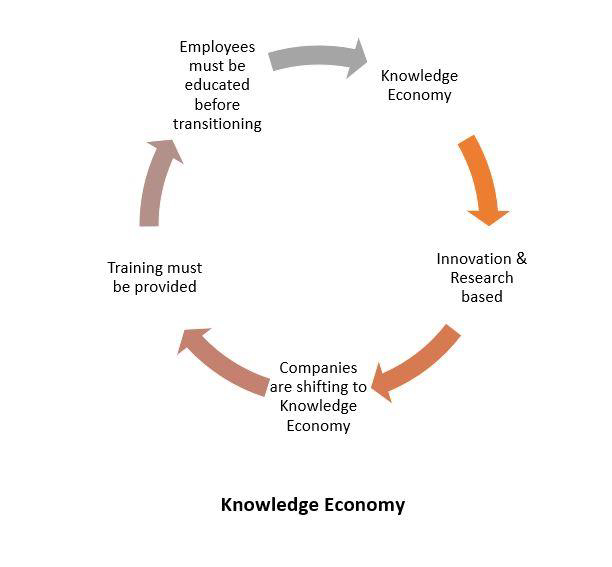
 Data Structure
Data Structure Networking
Networking RDBMS
RDBMS Operating System
Operating System Java
Java MS Excel
MS Excel iOS
iOS HTML
HTML CSS
CSS Android
Android Python
Python C Programming
C Programming C++
C++ C#
C# MongoDB
MongoDB MySQL
MySQL Javascript
Javascript PHP
PHP
- Selected Reading
- UPSC IAS Exams Notes
- Developer's Best Practices
- Questions and Answers
- Effective Resume Writing
- HR Interview Questions
- Computer Glossary
- Who is Who
Knowledge Economy – Definition, Examples & Issues
When it comes to consumption and production, the knowledge economy refers to a system founded on intellectual capital. The capacity to profit on scientific discoveries, as well as fundamental and applied research, is specifically referred to as innovation. These activities have grown to constitute a significant portion of all business growth in most industrialized nations.
There are intangible assets that every employer monitor and some examples is the knowledge and intellectual property provided by the employees as it may contribute

significantly to the growth of the company.
Key Points Briefly
Most developed countries around the world lay importance on academic and scientific research that is also referred as knowledge economy.
The knowledge economy is characterized by the commodification of invention based on research, which is accomplished via patents and other kinds of intellectual property.
As the economy continues to develop, the world is shifting towards knowledge-based economy.
Example – Knowledge Economy
Let us consider a company ABC.INC that is involved in developing a new software. The research & development department (R & D) works in developing, analyzing trends, to develop the new computer so that their users can enjoy it more. This information could be shared with technical development team who uses this research while developing the new software.
The Knowledge Economy – Analysis
Economies that are mostly focused on agriculture and manufacture are from the less developed nations and it is generally believed that a sign of developed economy is focus on services and manufacturing sector.
While broadly these three are the major revenue generation sectors for nations, these could vastly differ depending on the countries. Knowledge economy consists of research, consultancy and other related fields.
Bayh-Dole Act of 1980 was a watershed in the handling of property rights in the United States because it enabled universities to retain ownership of innovations or discoveries produced with federal research and development money and to negotiate exclusive agreements with third parties.
As there is vast amount of information being shared, it is natural that we have evolved towards knowledge economy. This allows individuals and companies with frameworks to protect their rights and businesses. It must be noted that companies are not allowed to incorporate these assets on their balance sheets under generally accepted accounting standards (GAAP).
What issues must companies consider?
Companies could struggle while moving from a traditional based economy to knowledge-based economy. Let us consider a cloth manufacture who has decided to move to a knowledge-based economy and if finding things difficult.
Before the decision to transition is actually made, the company must make sure the employees are ready to adapt to the new work environment. This could be done through training programs to smoothen the transition.

